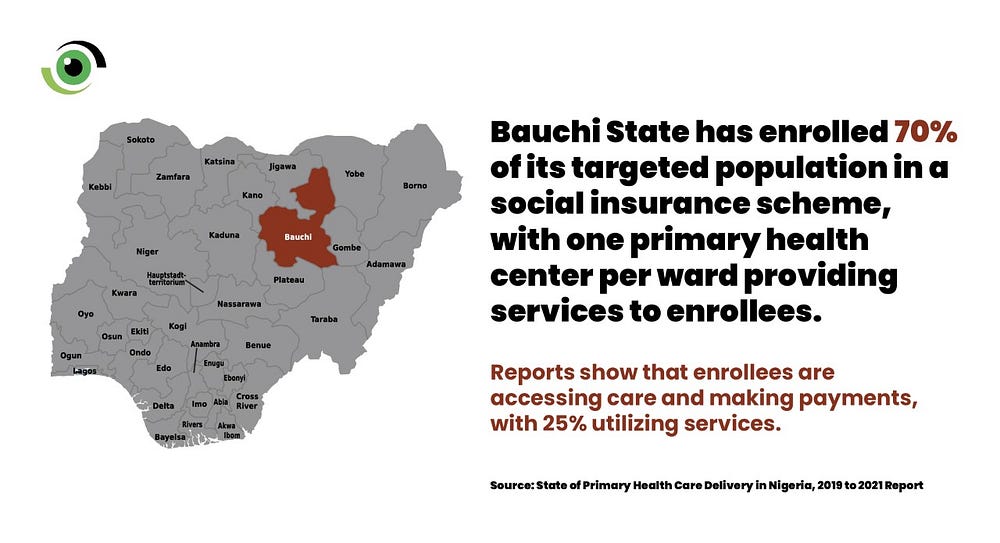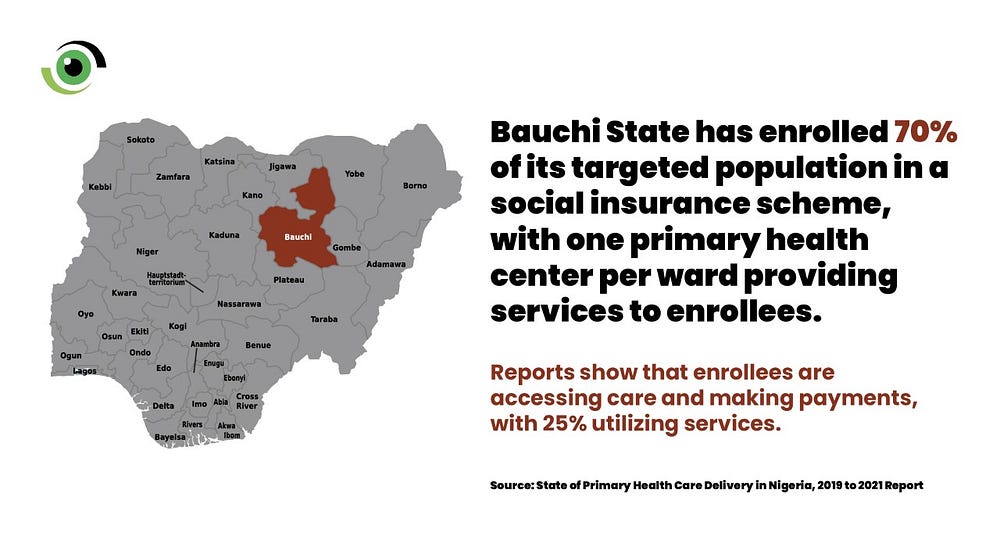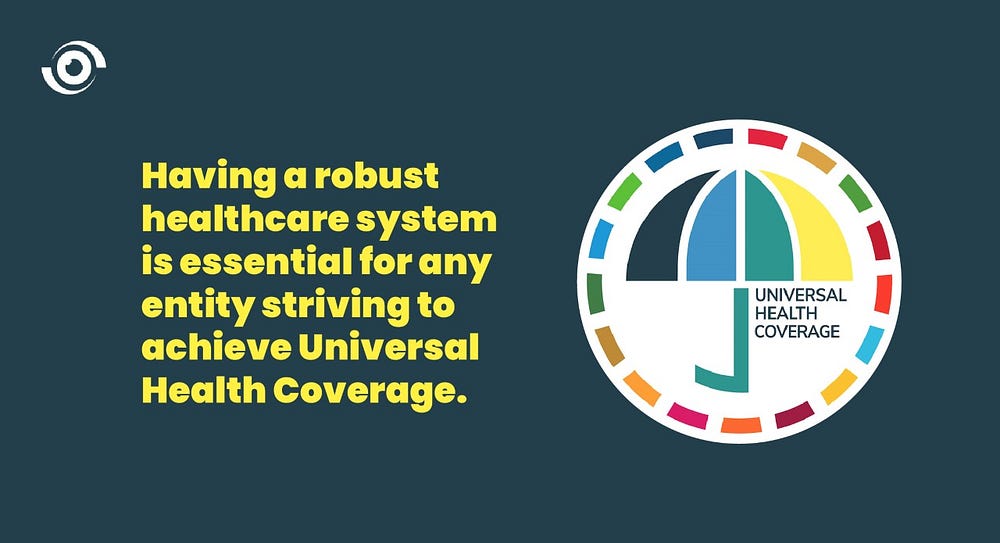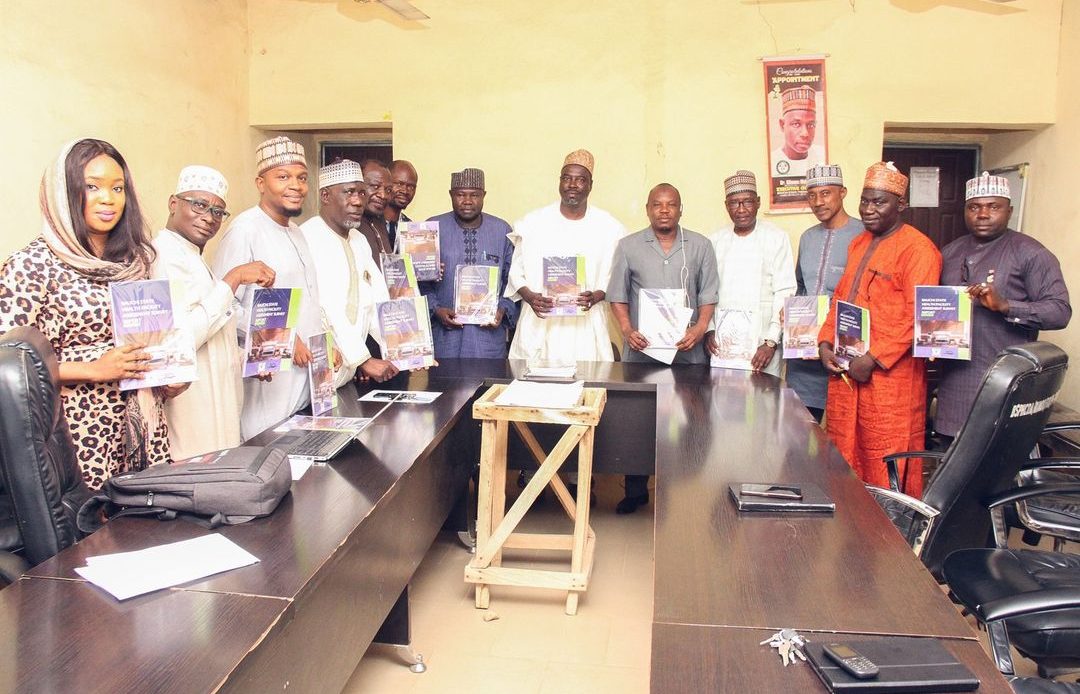By Joy Ikott (Lead Writer)
State Health Insurance Schemes are a vehicle through which State governments seek to achieve Universal Health Coverage (UHC) in accordance with the National Health Scheme Act, and the National Health Insurance Authority (NHIA) Act. Bauchi State is one of the 35 states that has signed a State Social Health Insurance Scheme into law. To ensure that the beneficiaries of the social health insurance scheme are provided with quality and accessible health services by functional healthcare facilities, the Bauchi State Health Contributory Management Agency (BASHCMA) was also established.
In accordance with its mission to deliver high-impact and cost-effective technical assistance towards improving access to quality health care and achieving sustainable development, Health Systems Consult Limited (HSCL) implemented the Strategic Purchasing for Family Planning, Maternal & New-born Child Health (SP4FP-MNCH) project, funded by the Bill and Melinda Gates Foundation, to support the Bauchi State Contributory Health Scheme. As part of its technical assistance to BASHCMA, HSCL partnered with NOI Polls in 2020 to conduct a baseline assessment of the service delivery status of health care providers across all the health facilities in the state. The overall goal of the assessment was to provide BASCHMA with a true picture of the state of facility readiness at the start of the scheme and serve as a benchmark against which they will measure progress over time.
Assessing the health facilities
A similar assessment was conducted in Lagos State. Both studies were carried out during the COVID-19 pandemic therefore, the same methodology was employed — a mixed method qualitative and quantitative data collection approach, where the data was collected remotely via telephone interviews as a result of the lockdown. Representatives from the State Ministry of Health, Hospitals Management Board, State Primary Health Care Development Agency, and the Bauchi State Health Contributory Management Agency were among the target officials interviewed for the qualitative part of the assessment. The telephone interview call protocol specified that each health facility on the list was attempted for an interview six times before it was categorised as a facility with unsuccessful calls. Data from 1,065 health facilities was collated and a total of 670 health facilities were assessed successfully.
What the results revealed
The specific objectives of the assessment were to determine the distribution pattern of the different types of health facilities in the state, the levels of service availability, general service readiness, and service-specific readiness of health care facilities, as well as their capacity to provide high-quality services on the Bauchi State Social Health Insurance Scheme.

The facilities were assessed using these parameters — human resources for health; availability of basic infrastructure, basic medical equipment, health services in health facilities, medical supplies and commodities, health insurance coverage, financial management systems, clinical governance, and the COVID-19 response. The findings offered much needed insight into the state of the health facilities in Bauchi State, some of which are highlighted below:
- Private health facilities have more pharmacists, nurses, midwives, medical doctors, specialists, lab scientists, and physiotherapists on staff than government-owned health facilities.
- Approximately 40% of health facilities are without electricity, predominantly in government owned health facilities. This negatively impacts the quality of healthcare service delivery across the state.
- Access to clean water supply is a challenge across health facilities in Bauchi state as only about 43.5% (4 in 10) of the health facilities have a water source within 500 meters of the facility. About 12.2% of the facilities in the state do not have a water source.
- Family planning services, antenatal care services, post-natal services, immunisation services, malaria care, primary emergency care, and diagnostics services are offered by more than 70% of the facilities.
- 95.5% of the facilities in the state do not provide services for health insurance enrolees, and only 29.1% of them are served by the state’s private facilities.
- Only 39.4% of health facilities in Bauchi State have a clinical governance committee, and clinical governance framework guides were available in 38.5% of them. The lack of a clinical governance committee and clinical governance framework in more than 50% of the health facilities assessed is an indication that the quality of care across the state will not be consistent.
Validation and launch of report
In October 2022, in partnership with the Bauchi State Ministry of Health, HSCL convened a meeting with stakeholders from the public and private sectors to validate the Bauchi State Health Facility Assessment Report. Speaking at the meeting, the Permanent Secretary/Acting Honourable Commissioner for Health, Dr. Ali Babayo, said “The Bauchi State Government is giving serious attention to the health sector in the scheme of things, and this has been demonstrated in the government’s involvement in addressing the health needs of the state.” While highlighting the state government’s commitment to ensuring the provision of qualified human resource for health in the state’s primary and secondary healthcare facilities, he also added that plans were underway to commence renovation of health facilities in the state.

Present at the event was the Permanent Secretary/Acting Honourable Commissioner, Bauchi State Ministry of Health (SMOH), the Director of Planning, Research and Statistics, SMOH, Chairman of the BSPHCDA, Medical Director, Drugs and Medical-Consumables Management Agency (DMMA), the Chairman, Association of General and Private Medical Practitioners of Nigeria, Bauchi State, and other partners.

While launching the report, Dr. Babayo, expressing his pleasure with the project said, “It demonstrates that we are serious and interested in meeting the desired standard of healthcare delivery in Bauchi state as we roll out a well-established state health insurance scheme.” He added that it presented specific suggestions that could be incorporated into a roadmap for enhancing health services for people living in Bauchi State.
According to the report on the State of Primary Health Care Delivery in Nigeria 2019 to 2021, Bauchi State has enrolled about 70% of its targeted poorest and vulnerable population into a social insurance scheme. The state has empanelled one primary health centre per ward to provide services to enrolees who are reported to be accessing care and making payment. About 25% of enrolees are utilising the services. In addition, in compliance with Section three (b) of the NHIA Act which mandates the NHIA to make health insurance mandatory for all Nigerians and legal residents, in November 2022, (BASHCMA) reported that it had commenced the implementation of the formal sector programme.

Promoting a robust health system
The assessment began in November 2020 and ended in December 2021, and while the overall results are commendable, the HSCL team believes that some results may have changed since the assessment. They urged the Bauchi State government to consider paying closer attention to some of the highlighted recommendations:
- Focus on employing more health personnel like laboratory scientists, CHEWs, and pharmacists.
- Provide alternative power supply sources for facilities without electricity and improve access to Water, Sanitation, and Hygiene (WASH) services.
- Intensify efforts to make essential medical diagnostic equipment available in government-owned facilities.
- Promote health insurance in the state, encourage the residents to enrol, and the facilities to get on board the State Health Insurance Scheme.
- Develop a legal framework for clinical governance for all health facilities in the state to ensure uniformity in the quality-of-service delivery and data reporting at all levels.
- Incentivise more private health facilities to meet the onboarding criteria, to increase the number of facilities on the State Health Insurance Scheme.

Having a strong healthcare system is essential for any entity striving to achieve Universal Health Coverage. Such a system is crucial for providing high-quality, equitable, and essential health services. Health financing plays a vital role in this system, as it ensures that adequate funds are available and allocated to provide affordable and quality health services to all members of the population. This is consistent with the fundamental principle of UHC, which aims to ensure that all individuals have access to necessary health services without facing financial burden.


